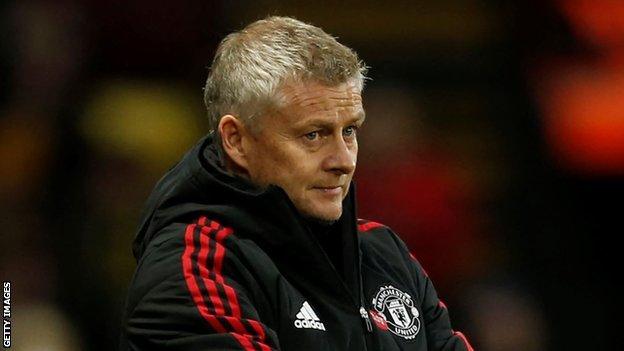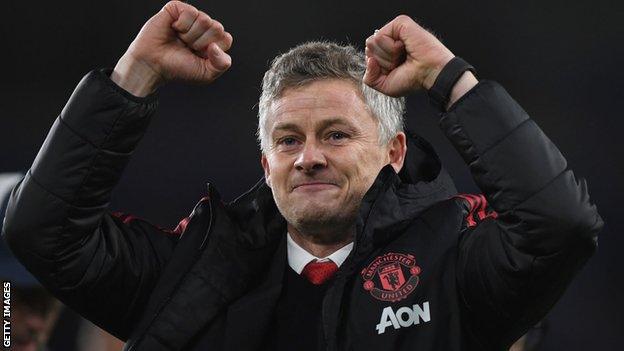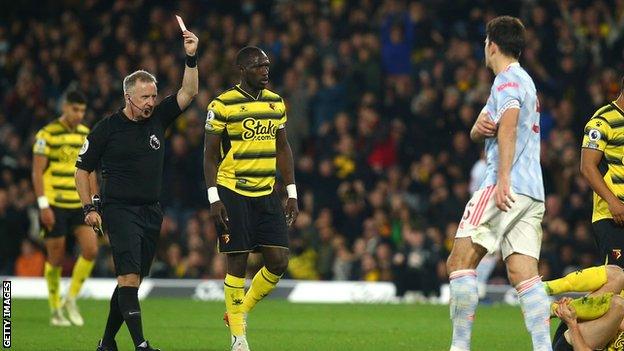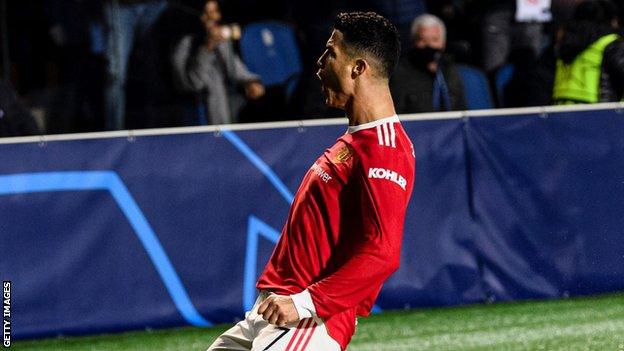Ole Gunnar Solskjaer: What went wrong at Man Utd?
- Published

Ole Gunnar Solskjaer first took over as interim manager of Manchester United in December 2018
It is the speed and steepness of the descent that has taken Manchester United by surprise.
Not too long ago, it was all so different. There was much backslapping and an air of celebration when United secured Cristiano Ronaldo's return on 27 August amid strong interest from Manchester City.
When the Portuguese superstar marked his second United debut with two goals in a 4-1 win over Newcastle, all seemed well. When hundreds of fans waited more than half-an-hour to hail the Portuguese superstar as he conducted interviews after that match, it seemed inconceivable that 10 weeks later, Ole Gunnar Solskjaer would be sacked.
But, after surviving the 5-0 home defeat by Liverpool on 24 October and the 2-0 'humiliation' by Manchester City on 6 November, Solskjaer was catapulted out of the manager's chair following Saturday's 4-1 loss at Watford.
The statistics are stark. Four wins in 13 matches in all competitions since that Newcastle victory. Seven points from eight Premier League games, with United keeping one clean sheet. Nineteen goals conceded in seven games. Out of the Carabao Cup.
It would have been even worse but for an injury-time David de Gea penalty save that ensured a 2-1 Premier League win at West Ham in September, and three critical late goals from Ronaldo in the Champions League - late winners at home to Villarreal and Atalanta, and a dramatic point-saver against Gian Piero Gasperini's side in Italy.
Solskjaer: The pros

Solskjaer guided United to third and second in the Premier League in his two full seasons in charge
For some, Solskjaer's exit has been a long time coming. They were never convinced the Norwegian was up to the job in the first place and have been waiting for him to fail since his appointment was made permanent in March 2019.
That judgement is harsh.
Solskjaer restored pride to a club that had turned in on itself during the last days of the Jose Mourinho era. Without question, he acted and took decisions for the benefit of Manchester United, a club seared into his heart.
He secured a second-place finish in the Premier League last season, which is as high as United have managed since Sir Alex Ferguson retired in 2013. After 19 games, they were top, a position they have not enjoyed at such an advanced stage of the season since Ferguson left.
Had they beaten Villarreal in the Europa League final as expected, Solskjaer would have given himself an element of protection against the problems that engulfed him. But De Gea missed in a bizarre penalty shootout in Gdansk and, as some felt at the time, the effect of those fine margins going against the Norwegian are now being felt.
Premier League: How 'fantastic' Watford put four goals past 'embarrassing' Man Utd
Solskjaer: The cons
That is not to say Solskjaer bears no responsibility for United's collapse.
It has been obvious for a long time which players he trusts and which he does not. Evidently, Donny van de Beek falls into the latter category.
It is not entirely clear what role Solskjaer played in Van de Beek's £35m arrival from Ajax in September 2020, but he never gave any particular impression he thought the Dutchman could be a significant presence at Old Trafford.
BBC Sport has been told by more than one source that Solskjaer felt there was a nervousness about Van de Beek, leading to uncertainty over whether he could flourish at United.
That view is slightly odd given nearly every match last season was played in an empty stadium. That Van de Beek came on and scored as United thrashed about looking for a way back into the Watford game undermined Solskjaer's view even more.
Van de Beek was among a number of United players who have been edged to the periphery this season.
Dean Henderson's hopes of challenging for the goalkeeping slot have been dashed, although, admittedly, David de Gea has been one of United's best performers.
However, with De Gea and Henderson on first-team duties, Tom Heaton has been reduced to the role of third choice, which does not seem to be the best use of the 35-year-old, who was in the England squad before he got injured two years ago.
Jesse Lingard posted a picture of himself on social media wearing a West Ham kit on Friday. This came after BBC Sport and other media outlets, learned of the collapse of contract talks with United.
Lingard's outstanding loan spell at West Ham in the second half of last season propelled him back into the England reckoning. He opted not to return to London Stadium on a permanent basis in the summer, partly because he understood Solskjaer would offer more opportunities, which have not arrived.
Crisis of confidence

Harry Maguire, who joined Manchester United in 2019 for £80m, was sent off against Watford on Saturday
On 12 November, Harry Maguire stuck his fingers in his ears - a gesture interpreted as a dig at his critics - after scoring in England's 5-0 win over Albania. Eight days later, the United captain was sent off playing for his club in the defeat at Watford.
Those two matches encapsulated the defender's recent form. Good for England, terrible for United.
That could be seen during the 4-2 defeat at his old club Leicester in October, when his error offered the home side a way back into a game they were losing. It could be seen too during the Manchester derby in early November, when he and Luke Shaw dithered, and allowed City's Bernardo Silva to take control and score.
Maguire and Shaw were passive, waiting for the ball to go out of play. That attitude contrasted sharply with Bernardo, who was pro-active in trying to make something happen. It hinted at a timidity that runs throughout the United side.
Aaron Wan-Bissaka's concentration has never been great. But after being caught in no-man's land against Liverpool in October and having it exposed mercilessly by TV pundits, he did virtually the same thing against City in the build-up to their opening goal.
Bruno Fernandes' failure to take a clear chance to equalise at Watford came after a performance against City that was as poor as he has produced since he came to United, as he gave cheap possession away time after time.
It has never been entirely clear why United spent £47m on Brazilian midfielder Fred. And the only thing that can be said about the injured Paul Pogba is that no-one is arguing that things would have been any better had the Frenchman - sent off after coming on as a substitute against Liverpool - been available.
Manchester United: Ole Gunnar Solskjaer "honoured" & "privileged" for trust shown by club
Was Solskjaer willing to challenge the owners?
One of the accusations regularly thrown about Solskjaer is that he doesn't have a strong footballing style to mark him out, meaning that he pales in comparison with managerial heavyweights such as Pep Guardiola, Jurgen Klopp and Thomas Tuchel.
This view ignores the fact he has beaten sides managed by all three, while also getting the better of Julian Nagelsmann, Marcelo Bielsa and Mauricio Pochettino.
Initially, Solskjaer felt his squad lacked the fitness to press the way he wanted. He got rid of Romelu Lukaku and Alexis Sanchez with the aim of having a younger strikeforce who could run and force opposition defences into mistakes.
His midfield still looked weak, but there was a coherent pattern to Solskjaer's recruitment. He signed Jadon Sancho early in the close season and persuaded Edinson Cavani to remain at Old Trafford for an extra year when it had appeared the Uruguayan was minded to move on.

Cristiano Ronaldo had an immediate impact on his return to Old Trafford
Ronaldo's arrival smashed the template.
At a stroke, the number nine role, which Cavani and Mason Greenwood had been expected to share, was handed over to the 36-year-old. As a consequence, Cavani has barely played and Greenwood has occupied a wide role, reducing Sancho's opportunities.
Ronaldo's abilities are beyond question and his goals have saved United more than once this season. But pressing defenders out of possession was not his game 10 years ago and nothing has changed.
Did Solskjaer really value Ronaldo's Old Trafford return as much as the executives who knew what a commercial impact the Portuguese superstar would have?
And, if not, was he willing to say so?
Even when Solskjaer was still in his job and results were going well, a few sources, steeped in United's history, wondered whether he was prepared to go to war internally for what he believed was right, whether he was prepared to challenge the Glazer family and executive vice-chairman Ed Woodward.
Deep down, the theory goes, Solskjaer always felt he was fortunate to get such a massive job given his relatively low-profile managerial CV, and his nature meant he would accept imperfect situations rather than rail against them.
That narrative may explain why Solskjaer survived those awful defeats by Liverpool and Manchester City. It may also explain why United allowed Antonio Conte to join Tottenham rather than making a move for the demanding Italian.
Now though, they are on the search for post-Ferguson manager number five.
And after what has gone before, there can be no real confidence they will get it right this time.

Our coverage of Manchester United is bigger and better than ever before - here's everything you need to know to make sure you never miss a moment
